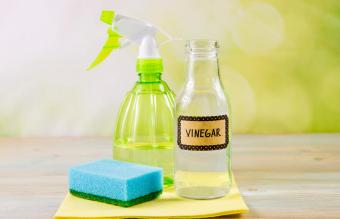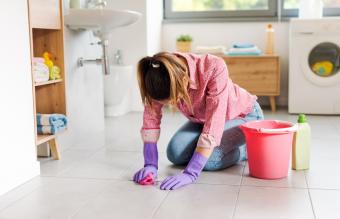
Many people use vinegar as a household cleaner and disinfectant, but is vinegar a good cleaner? Does vinegar kill germs? A study published in PubMed shows that vinegar and other natural solutions are far less effective at killing germs than many commercial household disinfectants, so if you are particularly concerned during outbreaks of cold, flu, and other illnesses, then vinegar is probably not the best choice for disinfecting.
Does Vinegar Kill Germs?
According to the science-based environmental non-profit foundation, the David Suzuki Foundation, household white vinegar is about 80% effective at killing germs. The active ingredient in vinegar is acetic acid, and in household white vinegar, the concentration is approximately 5% acetic acid to water. It is most effective against bacteria, as the acid crosses the cell wall and destroys the bacteria. However, it isn't as effective against many pathogens as other commercial products made with germ killing ingredients such as bleach and other germicides. So while vinegar may be a more environmentally friendly cleaner and deodorizer than commercial cleaners, when you need true disinfecting power, you probably shouldn't choose vinegar as your first line of defense against germs.
Ingredients You Should Never Mix With Vinegar
It is the acetic acid that gives vinegar its germ-fighting power, so when you combine it with a base (alkaline) substance, it neutralizes the acetic acid. Additionally, some ingredients combine with the vinegar to create toxic gases or extremely corrosive substances. Ingredients you shouldn't mix with vinegar include the following:
- Baking soda (neutralizes)
- Bleach (creates deadly chlorine gas)
- Castile soap (neutralizes)
- Lye (neutralizes)
- Hydrogen peroxide (creates potentially toxic and corrosive peracetic acid)
Boosting Vinegar's Disinfecting Power
There are a few ways you can boost the disinfecting power of vinegar for cleaning household surfaces. However, if disinfecting is what you want, vinegar (even when combined with other cleaners) isn't necessarily your safest bet. You're better off using bleach or a commercial cleaner proven effective at killing more than 99 percent of germs.
Use With a Household Steamer
You can saturate surfaces with vinegar, allow it to sit for about 20 minutes, and then wipe it away with a clean towel or paper towel. Follow by using a household steamer to kill remaining germs at an effectiveness rate of about 99.9%. Always test that vinegar won't damage surfaces by spraying it on a hidden patch and allowing it to sit for 20 minutes before wiping it away.
Add Tea Tree Oil
While there is a lack of quality scientific studies quantifying how effective tea tree oil is at killing microbes, one 2006 meta-analysis showed that tea tree oil is effective at killing certain types of bacteria, viruses, and fungi. Therefore, adding 10 drops per ounce of vinegar used may boost the efficacy of vinegar as a household cleaner for killing germs. However, it is still unlikely this approach is as effective as using commercial sanitizing products.
Is Vinegar a Good Cleaner?
The answer to this question depends on what you want the vinegar to clean. If you want to clean glass surfaces to a streak-free shine, vinegar is great. If you wish to deodorize drains or laundry, vinegar is a good solution. If you aren't particularly concerned about killing every germ, vinegar will kill about 80% of them; it's not the most effective cleaner available. However, if 80 percent is good enough, then vinegar is a great environmentally safe surface cleaner and disinfectant provided you don't mix it with ingredients it doesn't play well with. However, during cold and flu season or other illness outbreaks, you'll probably want to save this environmentally friendly cleaner for times when killing germs isn't as important.







